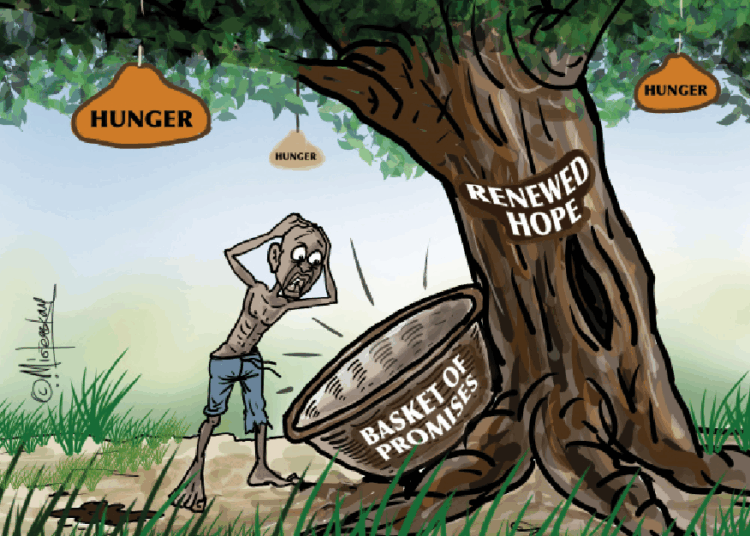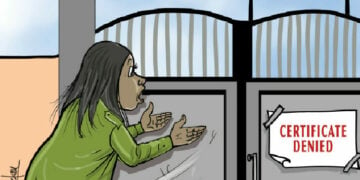Today marks exactly two years since President Bola Ahmed Tinubu, the man who thrilled some gullible Nigerians with his emi lokan philosophy in the build-up to the 2023 polls, assumed power. Tinubu rode to Aso Rock on the cusp of numerous promises and avowed commitment to building a better Nigeria.
Tinubu’s journey to the presidency was long and tortuous. He weathered the storm, including the landmines planted on his way by some persons in the party he played a fundamental role in forming and by some officials of the government he was instrumental in its emergence.
While seeking Nigerians’ support, Tinubu promised to prioritise security, economy, agriculture, power, oil and gas, transportation, and education. Incidentally, his promise to prioritise security and economy aligned well with his predecessor’s pledge.
Among many promises, PBAT pledged sufficient jobs with decent wages to create a better life for the citizens, especially the youth. This promise of job creation resonates well with many Nigerians because of its multiplier effect on the economy, poverty reduction and crime prevention.
PBAT also promised to provide adequate and cheap electricity to give Nigerians the energy required to boost small and medium enterprises and make basic healthcare, education, and housing accessible and affordable.
Economy, Security In Doldrums
However, after two years of the Tinubu presidency under the much-talked-about, but hollow Renewed Hope Agenda, neither the economy nor security has improved. There are no jobs for the youth, and the nation still battles an unemployment rate of about 53 per cent.
Indeed, the government alone cannot provide all the jobs needed. The private sector has crucial roles to play in this regard. However, with businesses struggling to survive in a toxic operating environment of high interest rates, taxation, inflation, a dearth of critical infrastructure, and insecurity, all of which have led to high operational costs, job opportunities in the private sector have continued to shrink.
The truth is, Nigeria’s current state of affairs is appalling, and no amount of gaslighting can change the fact that things aren’t working well. The security situation is deteriorating. Early this week, Abuja recorded a suspected suicide bombing, reminding us of the dark days of the UN House, Nyanya Park and the Force Headquarters’ bombings.
There are rampant cases of indiscriminate killing, banditry, kidnapping, and recurring attacks on communities. How come the president who promised to tackle the nation’s security challenges, and who, as a key figure of the opposition, took the ruling party to the cleaners over the deplorable state of security, has been unable to end this singular challenge confronting the nation?
Curiously, two years after the promise to combat insecurity, Nigerians, especially residents of some communities in Borno, Yobe, Taraba, Benue, Plateau, Sokoto, Enugu, Imo, Zamfara, Katsina and other parts of the country have been witnessing a deteriorating security situation. In Borno state, for example, there is a resurgence of the Boko Haram/ISWAP attacks amid an upsurge in Killings in Plateau, Benue and Taraba by suspected armed herdsmen.
Things are tough for a significant percentage of my countrymen, most of whom are wallowing in abject poverty, occasioned mainly by the government’s poorly thought-out policies that have translated to more hardship for the nation’s suffering and smiling citizenry.
Isn’t it strange that under an administration that promised to expand Nigerians’ access to affordable electricity, the citizens are grappling with epileptic power supply amidst exorbitant energy costs?
With PBAT’s assumption of power comes an astronomical increase in the petrol pump price, a hike in the electricity tariff, and arbitrary service charges. These have taken a serious toll on the citizens and businesses, with the broader implication being a contraction of the economy amid a rise in crimes.
All this is happening against the backdrop of the yet-to-be-felt promised relief from the removal of the fuel subsidy. Nigerians were told that with the suspension of subsidy payments, the nation would earn more revenue and be better placed to significantly address its challenges. The citizens are still waiting.
And The New Loan…
Like most Nigerians, I am worried that PBAT has approached the national assembly for authorisation to borrow 24 billion dollars, including a grant of 65 million euros, in this situation. Should the debt be approved, and there is nothing to suggest that it will not be, Nigeria’s debt will hover around N184 trillion.
Nigerians have been told that the fresh borrowing is to create jobs, promote skill acquisition, foster entrepreneurship, reduce poverty, enhance food security, and improve their livelihoods, even though not much is being said about previous borrowings.
As you read this, the lawmakers would have either approved the president’s request or are on the verge of approving it without necessarily asking relevant questions. You get nothing short of that from a pliant national assembly that disdains being thorough.
After two years, what has the Tinubu presidency achieved? A lot, probably, but certainly not up to the expectations of most Nigerians. It ended the fuel subsidy, which we have been told repeatedly benefited a few individuals. But where is the money? The PBAT administration repaid the $3.4 bn COVID-19 loan but has returned to borrowing, as demonstrated by the latest request to the national assembly. It implemented a N70,000 minimum wage for civil servants, which has since been rendered useless by the high inflation.
Talk Is Cheap
Nigeria’s situation in the last ten years of APC rule lent credence to the time-tested saying that it is easier said than done. Indeed, talk is cheap. If not, how come people who, as members of the opposition, dissected the Nigerian situation and presented solutions to it, yet failed woefully when entrusted with power to cause the change they have been preaching?
Unfortunately, in this worrisome situation, the administration is intensely focused on seeking reelection, and a flurry of endorsements is thrown at the president from various angles. If the last two years were not so cheerful, there is nothing to suggest that the next two years will be any better, with intense politics already taking place. At this neck-breaking speed with which governance is relegated to the background, who will save Nigerians from this political trickery?











